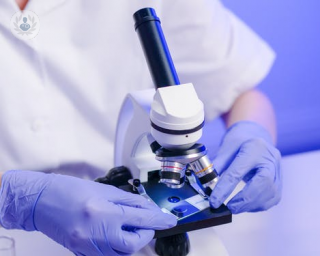What does it mean if your smear test results are abnormal?
If you have an abnormal smear test result, this does not mean you have cancer. Instead, you have some changes in the cells of your cervix. Depending on how abnormal these changes are, there is a potential for these cells to develop into cancer in the future.
Some types of abnormal result will not need treatment, whereas others may require follow-up tests and treatment. It depends on the type of result you get:
Low-grade changes
These involve minor changes to the cells in your cervix. It has been shown that around half of low-grade and borderline changes return to normal without treatment, so for these types of changes your doctor will usually recommend a HPV test rather than treatment. If the test shows a high risk of HPV, you’ll need a colposcopy to investigate further.
High-grade changes
This can involve from 2/3 to all of the lining of the cervix having abnormal cells. If left untreated, these cells have a high potential to turn into cancer. Therefore, if high-grade changes are detected you’ll be invited to have a colposcopy for further investigation and treatment.

How are abnormal cells treated?
There are a number of ways to treat abnormal cells in the cervix, depending on where they are and the type of abnormal cells you have.
The main treatments include:
- Cone biopsy – This is a procedure performed under general anaesthetic and involves removing a cone of tissue from your cervix to take away the abnormal cells.
- Cryotherapy – This involves using a cold probe to freeze and kill the abnormal cells.
- Laser ablation – This is a targeted treatment which is aimed at the abnormal cells to kill them.
- LLETZ procedure – This is a procedure performed under local anaesthetic and involves a small electrified wire which is used to cut away abnormal tissue.
Generally, these treatments will not have an effect on your fertility, and you should be able to return to work after a couple of days. Treatment is in most cases highly effective, and should remove all of the abnormal cells. Recurrence rates for abnormal cervical cells are around 5-15 per cent.
04-01-2019 10-04-2023Abnormal smear test
What does it mean if your smear test results are abnormal?
If you have an abnormal smear test result, this does not mean you have cancer. Instead, you have some changes in the cells of your cervix. Depending on how abnormal these changes are, there is a potential for these cells to develop into cancer in the future.
Some types of abnormal result will not need treatment, whereas others may require follow-up tests and treatment. It depends on the type of result you get:
Low-grade changes
These involve minor changes to the cells in your cervix. It has been shown that around half of low-grade and borderline changes return to normal without treatment, so for these types of changes your doctor will usually recommend a HPV test rather than treatment. If the test shows a high risk of HPV, you’ll need a colposcopy to investigate further.
High-grade changes
This can involve from 2/3 to all of the lining of the cervix having abnormal cells. If left untreated, these cells have a high potential to turn into cancer. Therefore, if high-grade changes are detected you’ll be invited to have a colposcopy for further investigation and treatment.

How are abnormal cells treated?
There are a number of ways to treat abnormal cells in the cervix, depending on where they are and the type of abnormal cells you have.
The main treatments include:
- Cone biopsy – This is a procedure performed under general anaesthetic and involves removing a cone of tissue from your cervix to take away the abnormal cells.
- Cryotherapy – This involves using a cold probe to freeze and kill the abnormal cells.
- Laser ablation – This is a targeted treatment which is aimed at the abnormal cells to kill them.
- LLETZ procedure – This is a procedure performed under local anaesthetic and involves a small electrified wire which is used to cut away abnormal tissue.
Generally, these treatments will not have an effect on your fertility, and you should be able to return to work after a couple of days. Treatment is in most cases highly effective, and should remove all of the abnormal cells. Recurrence rates for abnormal cervical cells are around 5-15 per cent.


Why is my smear test result abnormal?
By Dr Shahla Ahmed
2024-11-21
Receiving an abnormal smear test result can be worrying. In this article, expert in abnormal smear test results, consultant gynaecologist Dr Shahla Ahmed explains the science behind an abnormal test result and offers a guide to the next steps. See more


Abnormal smear and HPV: what you need to know
By Miss Avni Batish
2024-11-20
Cervical health is a vital aspect of overall well-being for women, and regular screenings play a crucial role in the early detection and prevention of potential issues. Two key terms often discussed in this context are "abnormal smear" and "HPV" (Human Papillomavirus). Leading consultant obstetrician and gynaecologist Miss Avni Batish explains the connection between abnormal smears and HPV and the steps you can take to maintain your cervical health. See more


What does an abnormal smear mean?
By Mr Stewart Disu
2024-11-19
If you've had a smear test and have been told the results are abnormal, understandably you're going to feel worried and nervous. We've asked our leading gynaecologist Mr Stewart Disu to explain what this could possibly mean and the likeliness of having developed cervical cancer. See more


Abnormal smear test: What does it indicate?
By Mr Rahul Nath
2024-11-19
A smear test, or a pap test, checks for changes in cervix cells that might become cancer. Results can be normal, unclear, or abnormal. Mr Rahul Nath, leading gynaecology expert, explains what an abnormal test result indicates, what a smear test involves, and steps that follow an abnormal smear test. See more
Experts in Abnormal smear test
-
Mr Rahul Nath
Obstetrics & gynaecologyExpert in:
- Robotic surgery
- Abnormal smear test
- Cervical cancer
- Endometrial cancer
- Human papillomavirus (HPV)
- Ovarian cancer
-
Mr Ashfaq Khan
Obstetrics & gynaecologyExpert in:
- Colonoscopy
- Human papillomavirus (HPV)
- Abnormal smear test
- Polycystic ovary syndrome (PCOS)
- Postmenopausal bleeding
- Cysts
-
Mr Narendra Pisal
Obstetrics & gynaecologyExpert in:
- Abnormal smear test
- Endometriosis
- Fibroids
- Gynaecological cancer
- Laparoscopic hysterectomy
- Robotic surgery
-
Mr Jullien Brady
Obstetrics & gynaecologyExpert in:
- Colposcopy
- Heavy periods
- Pelvic pain
- Menopause
- Ovarian cyst
- Abnormal smear test
-
Dr Shahla Ahmed
Obstetrics & gynaecologyExpert in:
- Ultrasound
- Abnormal smear test
- Colposcopy
- Ectopic pregnancy
- Miscarriage
- Transvaginal ultrasound
- See all

The Alexandra Hospital - part of Circle Health Group
The Alexandra Hospital - part of Circle Health Group
Mill Ln, Cheadle
No existe teléfono en el centro.
By using the telephone number provided by TOP DOCTORS, you automatically agree to let us use your phone number for statistical and commercial purposes. For further information, read our Privacy Policy
Top Doctors

London Gynaecology - Harley Street
London Gynaecology - Harley Street
145 Harley Street London W1G 6BJ
No existe teléfono en el centro.
By using the telephone number provided by TOP DOCTORS, you automatically agree to let us use your phone number for statistical and commercial purposes. For further information, read our Privacy Policy
Top Doctors

The Harley Street Clinic - part of HCA Healthcare
The Harley Street Clinic - part of HCA Healthcare
35 Weymouth Street, London. W1G 8BJ
No existe teléfono en el centro.
By using the telephone number provided by TOP DOCTORS, you automatically agree to let us use your phone number for statistical and commercial purposes. For further information, read our Privacy Policy
Top Doctors
-
The Alexandra Hospital - part of Circle Health Group
Mill Ln, Cheadle, CheadleExpert in:
- Hip
- Cardiology
- Shoulder and elbow
- Paediatrics
- Foot and ankle
- Knee
-
London Gynaecology - Harley Street
145 Harley Street London W1G 6BJ, Central LondonExpert in:
- Miscarriage
- Thrush
- Minimal access surgery (keyhole surgery)
- Colonoscopy
- Ultrasound
- Pregnancy
-
The Harley Street Clinic - part of HCA Healthcare
35 Weymouth Street, London. W1G 8BJ, Central LondonExpert in:
- Cancer
- Head and neck cancer
- Cardiology
- Intensive care
- Diagnostic Imaging
- Women’s health
- See all
- Most viewed diseases, medical tests, and treatments
- Menopause support
- Pelvic ultrasound
- Complex endometriosis
- Migraine
- Maternal mental health
- Joint pain
- Nutrition
- Weight loss injections
- Nipple discharge
- Minimal access surgery (keyhole surgery)







